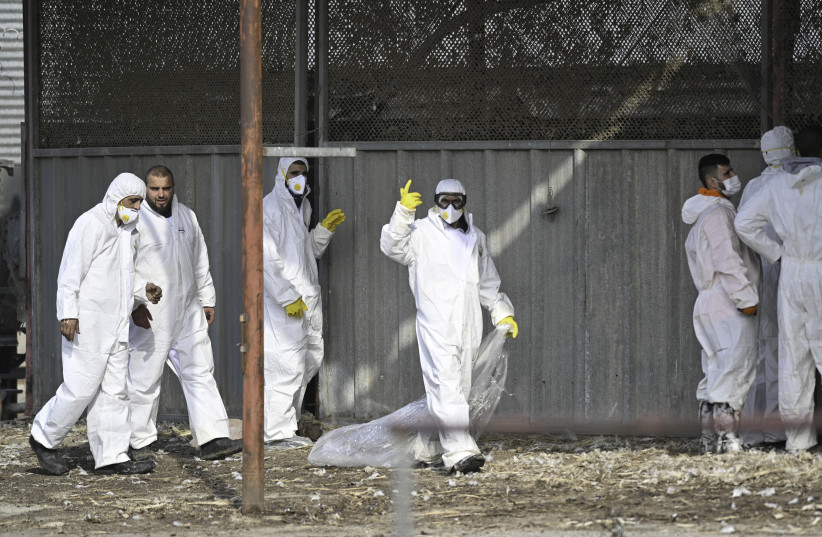About 107,000 turkeys were found to be infected with avian influenza in an outbreak discovered at a farm in Aviel, located northeast of Caesarea, the latest one in the continuing spread of the virus around northern Israel.
This is the fifth outbreak reported since just the beginning of this week. In total, about 232,000 birds have been found to be infected with the highly pathogenic avian influenza (HPAI) A(H5N1) virus since Sunday.
"The current wave of bird flu incidents has been with us for about three weeks. Throughout this period, ministry workers continue to work night and day to eradicate the spread of the virus, and continue to protect our health and the health of the animals around us," said Agriculture Minister Oded Forer. "The workers are available and act immediately while minimizing the suffering of animals."
The veterinary services are operating in an emergency format and continuing to actively locate outbreaks in northern Israel and isolate the hotspots.
Forer recently instructed his office to raise the egg quotas for farmers in Israel and to open the market for imports due to expectations of an egg shortage in the coming months. The minister is operating an inter-ministerial command room to handle the continuing bird flu outbreak in the country.

Over 8,000 migratory cranes have died due to the virus in a continuing outbreak in the Hula Valley. A number of additional outbreaks have been reported at farms in northern Israel in recent weeks and months.
On Monday, Environmental Protection Minister Tamar Zandberg signed a ban on hunting until the end of the hunting season on January 31 due to the risk of humans being infected by sick birds in close contact.
Hundreds of thousands of birds migrate through Israel on their way to Africa during this season, raising the risk of bird flu outbreaks. The Agriculture Ministry has called on all farmers to follow directives and ensure that their birds are kept separate from wild birds.
Amid the spike in bird flu outbreaks, the Health Ministry stressed that the public should only buy poultry and eggs from regulated places and ensure that eggs have a seal of inspection – and make sure to properly, hygienically and thoroughly cook poultry and eggs and keep a distance from wild birds.
A large number of bird flu outbreaks have been reported throughout Europe, Africa and Asia in recent weeks, mostly due to the H5N1 subtype, according to the World Organization for Animal Health.
The OIE has urged countries to increase surveillance for HPAI outbreaks, as the virus has been reported in over 40 countries since July.
The H5N1, H5N3, H5N4, H5N5, H5N6 and H5N8 subtypes of HPAI are circulating in bird and poultry populations across the globe, sparking concern at OIE which called this an “unprecedented genetic variability of subtypes... creating an epidemiologically challenging landscape.”
Germany’s Federal Research Institute for Animal Health, the Friedrich Loeffler Institute, told the German Deutsche Presse-Agentur (DPA) that Europe is experiencing its “strongest avian flu epidemic ever.”
The institute added that “there is no end in sight” as the virus spreads throughout the continent and around the world, with new cases reported on a daily basis.
